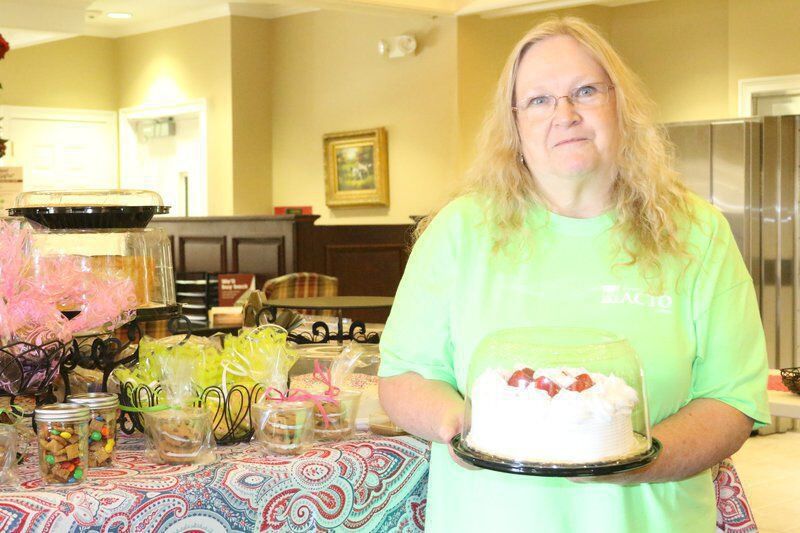Live United: Some nonprofits surviving COVID-19; others struggling
Published 8:00 am Wednesday, August 26, 2020

- File Photo: Amanda M. Usher | The Valdosta Daily TimesAnn Walker-Smith, executive director of Alzheimer's Caregiver Time-Out, is fundraising through a bake sale for the nonprofit's annual Time-Out for Bowling tournament in this 2018 file photo. The 2020 tournament has been rescheduled due to the COVID-19 pandemic. ACTO remains closed until further notice.
VALDOSTA – When the COVID-19 pandemic hit South Georgia, it didn’t just affect businesses. Nonprofits were impacted.
Some of the Greater Valdosta United Way’s agencies have been able to stay afloat while others say their doors may close permanently.
Trending
The Valdosta Daily Times spoke with representatives of seven of the United Way’s 20 partner agencies to see how they have been handling the pandemic.
Valdosta-Lowndes County Habitat for Humanity
COVID-19 has affected the Valdosta-Lowndes County Habitat for Humanity in more than one way.
Aside from a loss of donations, at least three people who are “directly related to Habitat have been diagnosed with COVID-19,” said Molly Ferrier, executive director.
As a precaution, the affordable housing agency has paused accepting volunteers though Ferrier said the number of people needing help continues to grow.
Other precautions include shortened hours for Habitat’s ReStore, the expectation that customers wear masks and making office staff only available by appointment.
Trending
Ferrier said the organization is not currently receiving federal funding and donations have dwindled.
“We are hoping to get more funding so we can do a big project and put more people in affordable housing,” she said.
If it does not get more money for its home builds, she said Habitat will close. If this happens, its current clients will be served by Habitat International.
“We will not have any control over the program if it closes,” Ferrier said.
Habitat is working to ensure its staff is healthy and employed to serve families, she said.
With the assistance of the United Way, she noted Habitat completed a home during the pandemic.
Habitat is looking to begin safely accepting volunteers so construction on homes can resume.
Ferrier urges the community continue its support.
“Support affordable housing in the area and understand that if a family has affordable housing, they are in a better place to care for their children,” she said.
Lowndes Advocacy Resource Center
Like Habitat, the Lowndes Advocacy Resource Center reports it is at risk of closing if financial support does not increase.
Although Dr. Harry Hamm, LARC executive director, has spent the past 20 years building reserves, Steve Jaramillo, assistant executive director, said it is “not unlimited.”
LARC – which benefits adults who have been diagnosed with developmental and intellectual disabilities – has lost about half of its normal state budget due to cuts, Jaramillo said.
“We have a number of consumers that have lost state funding altogether. Their need for services did not go away; they just lost the funding for it,” he said. “We would very much like to be able to continue to serve them; however, we cannot without the funding to do so.”
If LARC closes, he said the people it serves will not be able to work and socialize in an environment that is considered safe and structured for them. He said many of them do not have a safety net.
LARC temporarily closed some of its programs in the early days of the pandemic, when the facility was cleaned and sanitized completely. Personal protective equipment was gathered and reopening processes were tested, Jaramillo said.
LARC started a phased reopening May 18.
Since reopening, the organization reports its client list has decreased; it currently serves slightly more than half the number it did pre-COVID-19.
In mid-July, the resource center sent out a letter detailing precautions it takes to fight COVID-19.
LARC ensures people who are being transported have on masks and a temperature of 99.9 degrees or lower, assigns seats inside of the resource center and spreads them out at least six feet apart; people must wash and sanitize hands and the building is disinfected daily.
“There is no place that is free from COVID exposure,” Jaramillo said. “No one can eliminate the threat of a COVID outbreak. What we can do is try to mitigate that as much as possible. That is what we have done here.”
LARC asks for activities for its clients that allow for social distancing and safety practices.
Easterseals Southern Georgia
Two programs operated by the Easterseals Southern Georgia are in trouble, said Samantha Graf, director of family support and respite.
The Easterseals helps people who have been diagnosed with developmental and intellectual disabilities.
The organization has a family support program linked to a respite home that gives caregivers a break from their duties.
Aside from private pay, donations and waiver services, money from family support backs the respite home.
Due to state budget cuts for family support in June, 1,000 families were affected, Graf said.
“Initially, the proposed cuts called for a total program elimination which would have negatively impacted over 6,000 families; 2,000 of which are supported by ESSG,” she said.
“In late June 2020, it was announced that 50% of the total statewide family support funding would be restored. The resulting financial loss directly affected the families served by Easterseals including those served in our respite homes. Now, families do not have access to funds to help pay for respite care or their allocated funding has been greatly reduced. This budget cut affected all providers of family support services statewide.”
Graf said the families lost access to services, and the lack of funding has caused the Easterseals’ respite home to be “critically endangered.”
She said the respite home is in crisis. Due to the lack of financial assistance, families must go elsewhere outside of the area for respite care, she said.
“These families are hard-working citizens who are caring for loved ones with extensive needs. … Imagine receiving a letter that your support line has been cut due to budget cuts,” Graf said.
Clients require necessities such as medical supplies, home modifications for wheelchair access and therapy needs.
“The ESSG team is working to determine community-based resources to offer guidance to families affected by this crisis situation,” she said. “We are working with community board members to determine how the home can best support the community and obtain additional financial support.”
The Easterseals’ vocational program has also been hit by budget cuts, which gives clients the chance to develop job skills for successful employment, Graf said.
Several staff members have been laid off including employees working in Valdosta due to the cuts, she said.
The nonprofit offers ways to sponsor families needing respite, medical supplies or any other unmet needs, Graf said.
“We are committed to weathering this storm and serving our mission to help people to live, learn, work and play in their communities,” she said. “If you can help us in this endeavor, please reach out and connect with us.”
Lowndes Associated Ministries to People
With an increasing demand for its services, the Lowndes Associated Ministries to People homeless shelter is sustaining itself through the pandemic, staff said.
Though organizations are reporting troubles during this time, Yurshema Flanders, shelter director, promises LAMP will stand.
“LAMP closing is not in our vocabulary,” she said. “ … God has truly been blessing us and we cannot thank Him enough. LAMP staff, board and supporters are all believers. There has not been a need that has not been met.”
The shelter’s day center has been closed to the public since mid-March due to the pandemic.
Though the center is not open, Flanders said the following programs are available from 9 a.m.-1 p.m. Monday through Thursday: street outreach, showers, laundry service and food bags.
“Since the start of the pandemic, our services increased significantly in the beginning,” she said.
Calls were incoming from other states, she said, noting they decreased overall once the first round of stimulus checks were released.
“Now that most of the stimulus money is coming to an end, the need for our services are starting to increase,” Flanders said.
The homeless shelter has received funding from the Coronavirus Aid, Relief and Economic Security Act.
The Department of Community Affairs, the United States Department of Housing and Urban Development, the United Way and community donations have helped the shelter, Flanders said.
“Our community did not forget that we were here and seemed to put forth an extra effort to assist us with any of our needs,” she said.
Flanders said no one at LAMP, clients or staff members, have shown symptoms of or has been diagnosed with COVID-19.
Health precautions include masks, a hand-washing station, a cleaning schedule of hard surfaces, hand sanitizers and soap. Entering and exiting the shelter is limited. Potential clients must be screened for approval to enter the building.
LAMP asks for help with getting commercial washers and dryers; a 10-passenger van; a remodeled kitchen, dining room and shelter dorm rooms; painted common areas and an updated playground. Monetary donations and volunteers are also needed.
Jacobs’ Ladder Therapeutic Riding Center
Jacobs’ Ladder Therapeutic Riding Center joins LAMP in continuing to keep its organization running despite being affected by the pandemic.
Leslie Jacobs, founder, said although its clients list has shortened, shutting down operations is not being considered.
“We hope to continue offering our services and not directly affect our clients,” she said.
Through horseback riding, Jacobs’ Ladder caters to the special needs community. The nonprofit partners with organizations to sponsor riders who are not able to pay fees.
Aside from the United Way, Jacobs’ Ladder receives funding directly from its services.
“If we don’t have riders, we aren’t getting paid,” Jacobs said.
Since the pandemic’s start, the center has had to close its day program, which has welcomed students with special needs who visit during field trips.
“Due to concerns for students, they are staying on the school campus and not making trips,” Jacobs said.
She said staff will determine if school groups are able to visit as Thanksgiving nears.
The center has not only suffered a loss in clients but volunteers, as some of them are considered high risk for COVID-19, Jacobs said. The remaining volunteers arrive at the center bi-weekly due to a shortened schedule with riders.
“We hope to increase our numbers again in the fall depending on how things look with the COVID-19 virus,” Jacobs said.
With a reduction in funding, she said more money is needed to cover feeding and medical costs for the horses.
She added conservative spending is being practiced daily and staff is searching for grant money.
Jacobs’ Ladder has established safety measures to combat COVID-19, she said.
Reins, saddles and helmets are cleaned and sanitized between riders. Participants must sign a COVID-19 release. Masks are required in close distances. Hard surfaces, door handles and bathrooms are frequently wiped.
Jacobs’ Ladder has not had any clients or staff who have tested positive for the virus, Jacobs said.
She asks for Lysol spray, paper towels, tissue and bottled water donations.
“We are trying to operate as safely and as normally as possible,” she said. “Many parents have expressed gratitude that this is (the) one place that their kids can continue to come and life feels fairly ‘normal.'”
American Red Cross of South Central Georgia
Another United Way agency has been able to withstand the pandemic.
While the American Red Cross of South Central Georgia has cancelled blood drives and postponed home fire safety visits, the nonprofit is still working.
“COVID-19 has not changed our mission and our volunteers are consistently answering the call, both virtually and on the scene, when appropriate across South Central Georgia,” said Terri Badour, spokesperson.
“Our work never stops, even during this coronavirus crisis, and we remain focused on delivering our lifesaving mission each day.”
The disaster relief agency responded to home fires that impacted 60 residents in South Central Georgia in July, she said.
Though some of its programs are still operational, the cancellation of blood drives across the state has resulted in blood donations diminishing by thousands, she said, adding blood and platelet donors are needed to benefit hospitals.
Donations are being accepted by appointment at the Red Cross’ local donor center, 2517 Bemiss Road, Suite A.
“We especially need COVID-19 survivors to donate their plasma to help patients currently battling the virus,” Badour said. “Right now, the American Red Cross is distributing convalescent plasma products faster than donations are coming in resulting in an emergency shortage of this potentially lifesaving treatment.”
She noted the Red Cross is seeing additional expenses during the pandemic and volunteers are needed.
The agency is fighting against COVID-19 by offering some disaster relief virtually, following social distancing practices between donors and donor beds, wearing face masks or coverings and increasing disinfecting of surfaces and equipment.
“In times of crisis, the Red Cross is fortunate to witness the best of humanity as people and our partners step up to help those in need,” Badour said.
“We have faith in and greatly appreciate the generosity of the public, whose support allows us to continue our work during difficult times like this.”
Alzheimer’s Caregiver Time-Out
Alzheimer’s Caregiver Time-Out temporarily shut its doors in mid-March, but the nonprofit hasn’t stopped serving its clients, said Ann-Walker-Smith, executive director.
Even though its building remains closed, ACTO staff and volunteers have been delivering food boxes monthly to elderly residents and taking them to doctor’s appointments, she said. They have also been delivering medications and groceries.
“I check on them and send cards to them and try to help their families any way that we can,” Smith said.
None of ACTO’s clients have been diagnosed with COVID-19, she said.
ACTO – which temporarily relieves caregivers of people who’ve been diagnosed with Alzheimer’s or dementia from their duties – has had to cancel fundraisers and postponed one of its largest ones, Time Out for Bowling.
Usually held in September, Time Our for Bowling is slated for Nov. 13.
“We are not in dire need of funding at this moment, but if things do not improve, I can see ACTO being in trouble financially eventually,” Smith said. “We are very frugal with our money and have a little set back for times like this. Of course, we have to replace that money in order to stay stable as a nonprofit organization.”
While funding is not an immediate need, volunteers are needed to assist with food delivery.
Card stock, copy paper, tissue, paper towels hand sanitizer and masks are also requested.
Smith said ACTO will implement COVID-19 safe practices upon reopening, which will not happen until the current shelter in place order for the medically fragile is lifted.
Precautions are the use of a touch-free thermometer and masks, putting hand sanitizers in each room of the facility, only allowing one entrance, hiring more staff, installing a new hand-washing sink and gathering more cleaning supplies.
“These are tough times our country is going through,” Smith said. “We need to be united and work together to better our community and our country.”
| More Info
Habitat: valdostahabitat.org; (229) 245-1330 |





